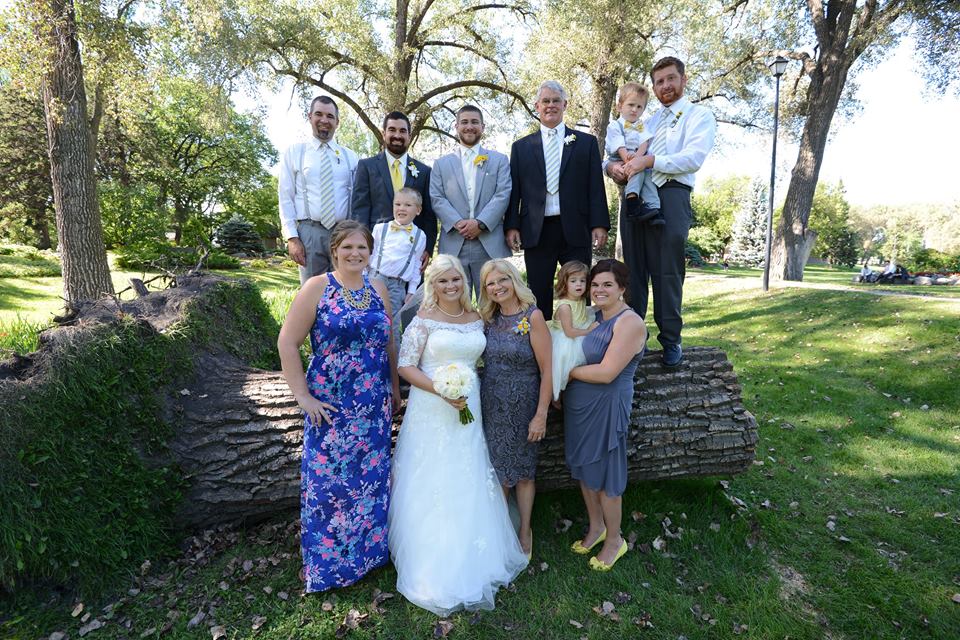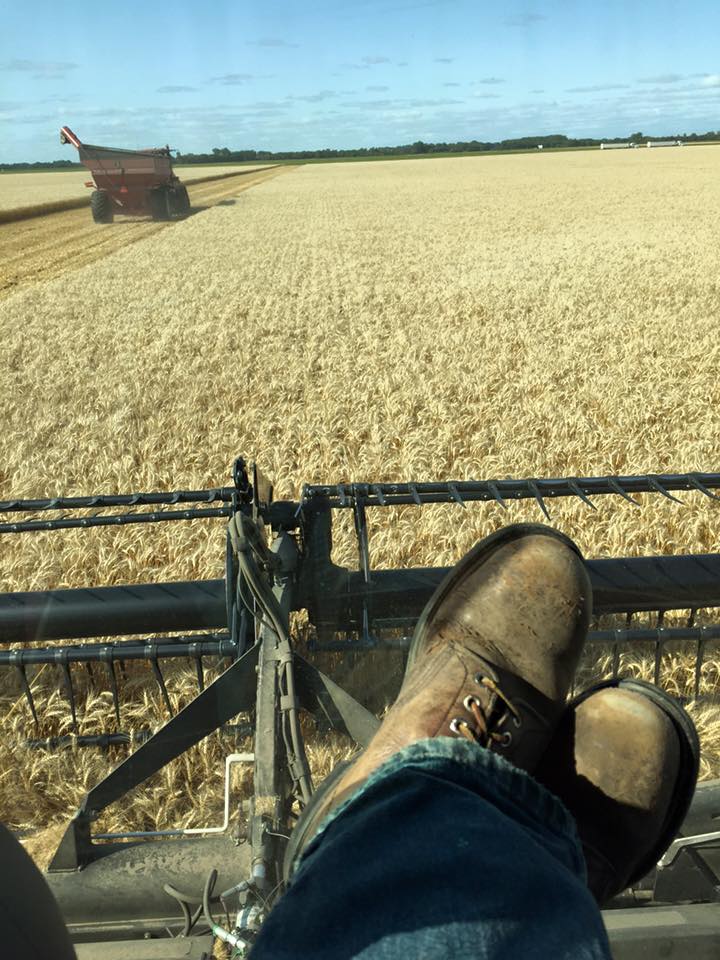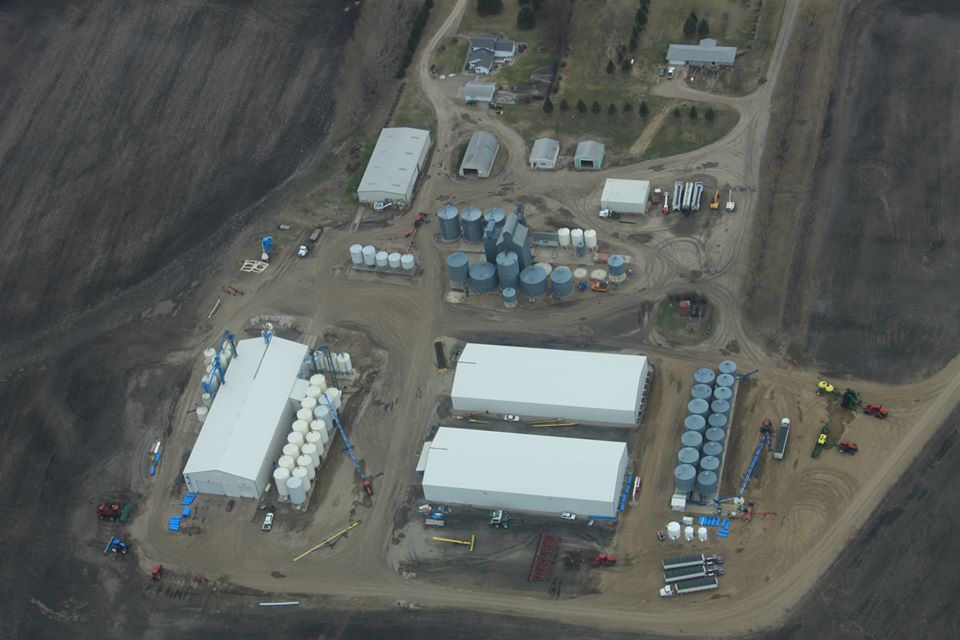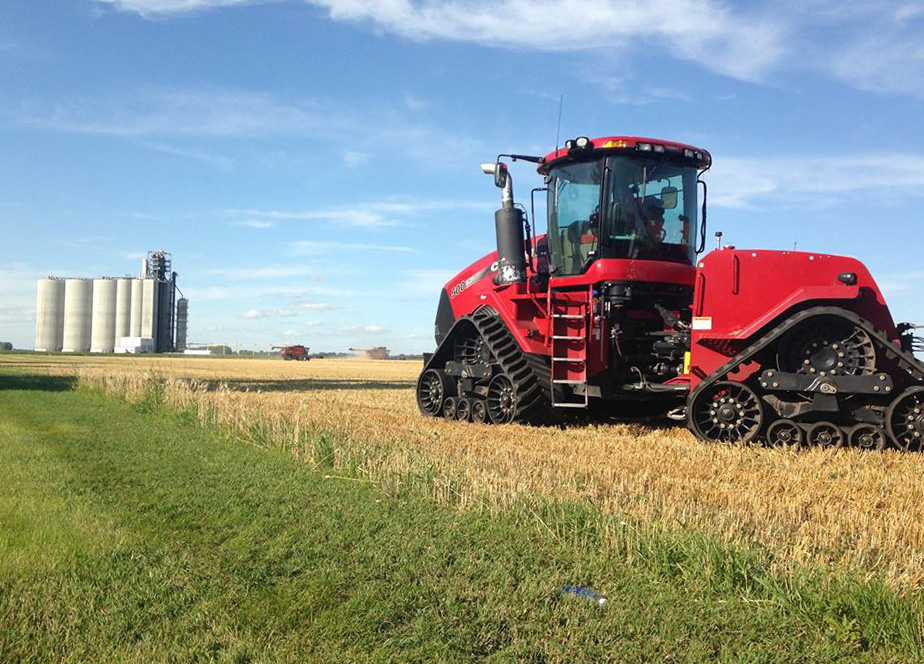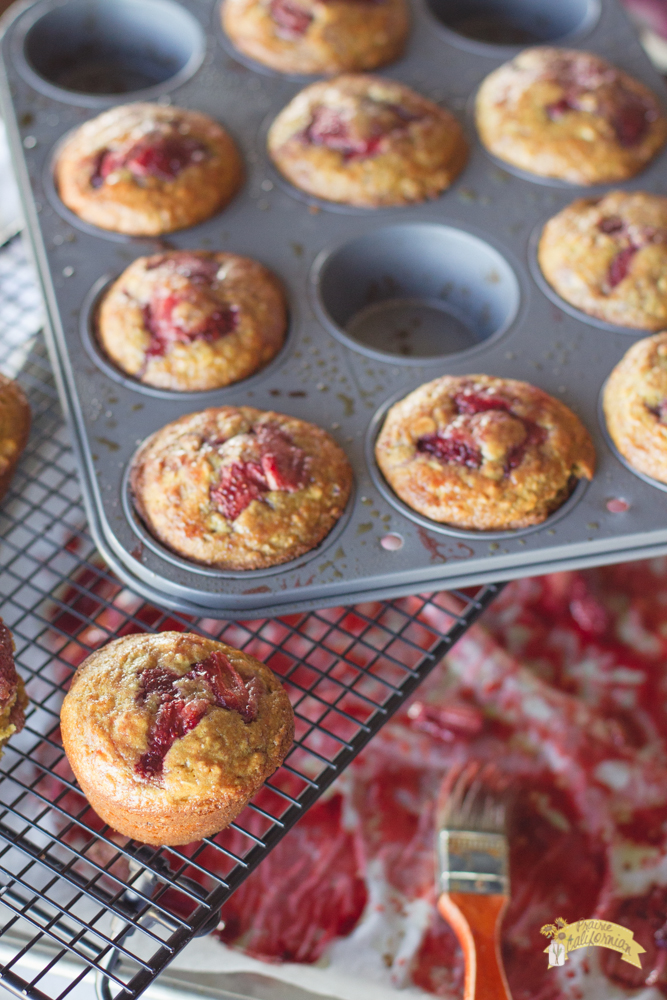
I’ve written a lot about eating and incorporating more whole grain foods into our diets on my blog. Unfortunately, I think most people don’t enjoy whole grain breads or baked goods as much as refined grains. I hope this recipe changes that. These whole wheat muffins are delicious and also utilize all whole grain flour and some yummy roasted strawberries! Today we are hearing from another fellow North Dakotan, Brian of T.E. O’Toole Farms in Crystal, North Dakota. You’re going to love this one!
WHEAT: BRIAN OF T.E. O’TOOLE FARMS
Crystal, North Dakota
When did you start farming?
I was born into the farm I now operate. It would be difficult to determine a starting point. My financial responsibility’s started when I was out of college at age 21.
What brought you into farming?
It started when I was young, just wanting to operate the machinery. As a child I would spend my time farming in the sandbox outside our home in the summer, and I continued pushing toy tractors and combines around the bedrooms all winter long. As I matured I learned that to be able to operating the equipment in the summer months, the winter months were spent repairing and maintaining it. I decided to become a diesel mechanic to help with this.
What chores did you have growing up on the farm?
My brother and I helped put up hay for the cattle in the summer, which meant no 4th of July. We would have to hoe tree rows, mow grass, pick thistles out of potatoes, paint buildings, clean up around the wheat bins, and be at my dad’s side for whatever else he needed help with. That meant everything from electrical wiring, welding projects, to shingling roofs.
Are there any differences between your farm now and your farm when you were a kid?
We got rid of the cattle. Buildings that had to be repainted have been replaced with steel. The yard is neat and well groomed. Repairs are not as frequent. My training as a diesel mechanic has been replaced with a computer technician. (Most repairs on today’s equipment are computer programming errors, not mechanical breakdowns.) Chemicals have replaced the hand labor in the fields. Chemical application has become more accurate and safer to those who handle it.
Who farms with you and what are their roles?
It is still a family farm. I am the one that is now referred to as dad, my wife, my sons and daughter, Allison, farm with me. All decisions are made by us as a whole. My wife Sara runs the books for the farm’s seed company, T.E. O’Toole Farm Seed Co., and handles the bean receiving operation. My oldest son, Casey, plants sugar beets, edible beans, corn, and harvests the beets. I still plant the wheat and soybeans. My youngest son, Kelly, operates the sprayer and combine. My son-in-law, Frank, does the books for our farm, electrical repairs, and handles all the yard maintenance. I have a hired man, Adam, that is the same age as my boys. He is an excellent welder and equipment-repair person, and operates a second combine for our farm.
What has been the hardest part of farming for you?
It has and will always be the uncertainty of your investments. My siblings that have left the farm look to the skies on a weekend hoping for break in the rain so they can get in a round of golf. My children and I look to the skies on any given day knowing that the weather it contains can give you a profitable year, or take away any chance of paying off any of the expenses we have put into the soil.
What has been the most satisfying part of farming for you?
That would have to be the lifestyle. It is a great place to raise a family — starting from the hours put into a prosperous crop, and ending with the disappointments encountered with a crop failure. When it’s a family farm it’s family value. Your children grow up with you by your side, on that tractor or combine. They see the appreciation you have for the land and outdoors, and share in the happiness you get from doing a job well done. They are also your rock when disappointing times fall on the farm.
What crops do you grow and why?
Wheat, soybeans, pinto beans, navy beans, black beans, corn, and sugar beets. These crops are grown for two reasons, crop rotation, and to share the risk of a crop failure.
What do you think was the most useful advance in farming?
In the machinery line: I would have to say it has to be a combination of size and dependability. The equipment of today really dwarfs equipment of just ten years ago. This means fewer people can do the same job in less time. (Remember farmers are now just slightly over one percent of the population in the US.) The equipment is also more reliable than in the past. (Less down time means more production.) On the genetic side: No doubt about it we have a healthier more productive plant. We can grow a healthier crop with the ability to add just the right amount of fertilizers and micronutrients to achieve our goals without over expensing our input costs. On the chemical side: Chemicals are not only safer to use for my generation, but they are also more target specific. With the spraying equipment of today we can accurately put ounces on per acre, where my father had to put on gallons per acre.
What is one message you’d like to get across to the general public about what you do?
We have entered into an era of farming that has surpassed my father’s era in multiple safety and accountability practices. With the help of GPS positioning we can map fields for productivity allowing us to apply fertilizer and chemicals only to the areas needed. Not to mention the ability to guide our tractors and combines hands free threw out the field to avoid over working and skips in the field. Our generation of farmers can feed 155 families with the same land my dad’s generation used to feed 25 families. The equipment used today is not only more efficient than my dad’s equipment; it is also more environmentally friendly and safer for the operator. The term, “freak farm accident,” is now a saying of the past.
What advice would you give to anyone interested in getting into farming?
To make it work you have to love the job. You will be one of one percent of the people in the US that will be watched by the other ninety nine percent. You will have to maintain a level head when being confronted by a relative, that shows up on memorial day or labor day, a day off for them, possibly the heart of your planting or harvesting season, to tell you what he knows about the misuse of fertilizer and chemicals he read about on Facebook. You will have to be willing to do your job Pro Boneo for a year at a time, yes the whole year. But most of all you must be willing to watch the sun rise and set from a tractor seat every day, and most weekends. You will have to enjoy being close to your family, especially your wife, to make it work you all have to participate. This is the one job you can do well, follow all the rules, and no matter how much you increase your time in the job, Mother Nature holds all the cards. If you have a loving family that will support the effort it takes to feed a growing world, THIS JOB IS FOR YOU.
You can find more from Brian on their website TE O’Toole Farm Seed Company, and by giving them a LIKE on Facebook!
You certainly don’t have to roast the strawberries for these muffins, but they are honestly the icing on the cake! And doesn’t take too awful long to roast while you are preparing the muffins.
PrintWhole Wheat Roasted Strawberry Muffins
whole wheat muffins with roasted strawberries
- Yield: 12 1x
Ingredients
- Roasted Strawberries
- 1 pound strawberries, hulled and sliced up
- 1 tablespoon honey
- 1 tablespoons canola or vegetable oil
- 1 tablespoon balsamic vinegar
- pinch salt
- Whole Wheat Muffins
- 1 cup whole wheat flour
- 1/4 cup sugar
- 1/4 cup brown sugar
- 2 tablespoons wheat germ
- 1 1/2 teaspoons baking soda
- 1 teaspoon ground cinnamon
- 1/2 teaspoon salt
- 1 1/2 cups quick cooking oats
- 1/3 cup dried cranberries
- 1 cup half and half
- 1/4 cup canola oil
- 1 teaspoon vanilla extract
- 1 large egg, lightly beaten
- 1/2 cup hot water
Instructions
- Preheat oven to 350º F. Line baking sheet with parchment paper.
- Combine strawberries, honey, oil, balsamic vinegar, and salt in a medium bowl. Mix until strawberries are evenly coated.
- Spread strawberries evenly onto the prepared sheet pan. Bake until juices just begin to thicken about 45 minutes. Set aside to cool.
- Increase oven to 375 degrees.
- Combine flour, sugars, wheat germ, baking soda, cinnamon, and salt into a large bowl. Whisk together until well combined. Stir in oats and cranberries.
- In a small bowl, combine milk, oil, vanilla, and egg. Add to the flour mixture, stirring until just mixed. Stir in the hot water and let batter sit for about 15 minutes.
- Spoon batter into muffin cups coated with cooking spray, filling only halfway. Gently place 2-3 roasted strawberry pieces into each muffin cup. Then cover with remaining batter. Place 2-3 roasted strawberry pieces on top of each muffin.
- Bake at 375 degrees for about 20 minutes or until a toothpick comes out clean when inserted into middle of muffins.. Once removed from oven, brush the tops of the muffins with juices from roasted strawberries.
- Remove muffins from pan and place on wire rack to cool. Enjoy.

